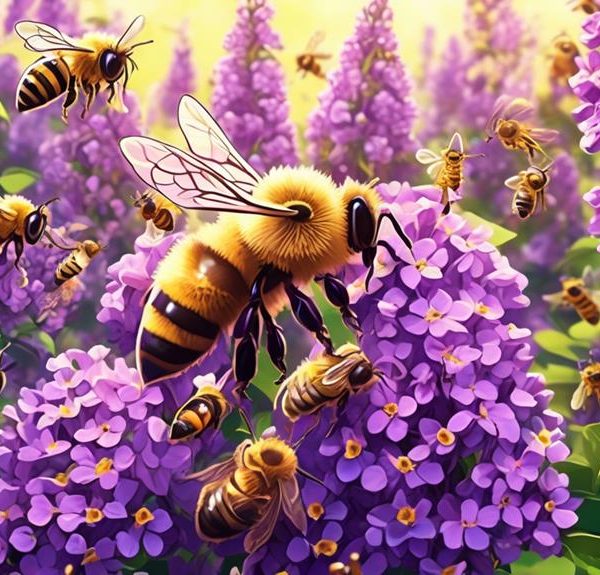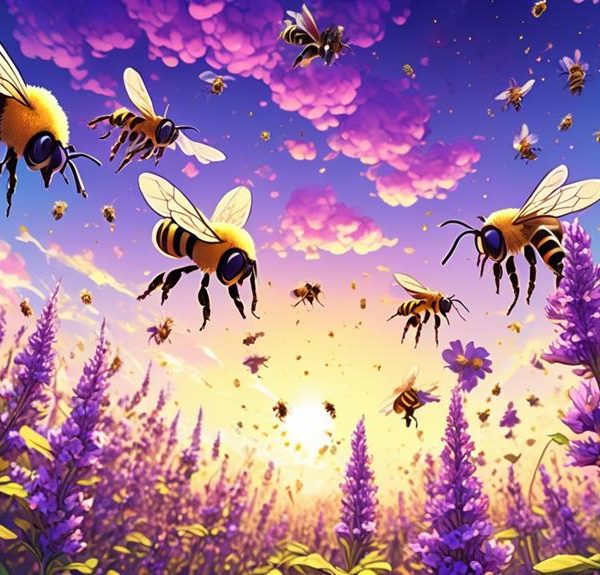Outwit nature's buzzers as we delve into the surprising reality – do bees actually like bug spray?
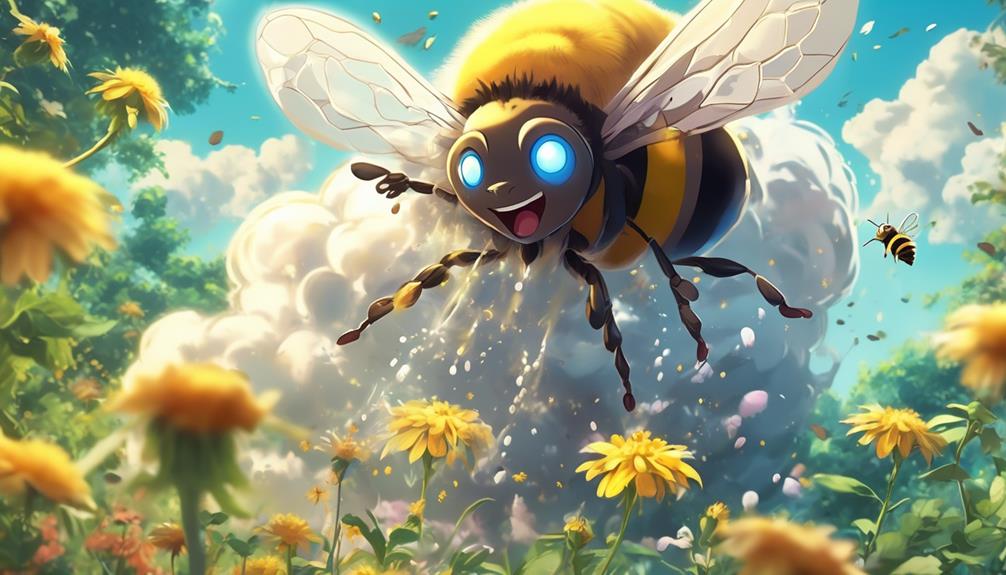
Do Bees Like Bug Spray
Imagine you're hosting a summer barbecue in your backyard. You've set the table, fired up the grill, and just as you're about to enjoy the company of your friends and family, a swarm of bees descends on your gathering. In an attempt to ward off these uninvited guests, you grab the nearest can of bug spray and begin to douse the area.
Surprisingly, you notice the bees don't scatter as expected, instead, they seem more attracted to the area. Could it be that bees actually like bug spray? This might go against your initial thoughts, but it's a question that merits a more in-depth look.
The answer could be more complex than you'd think and might change your approach to dealing with these buzzing intruders in the future.
Key Takeaways
- Bees are attracted to floral scents and can be inadvertently lured by the chemicals found in bug sprays.
- Bug sprays contain active and inert ingredients that can mimic the scent of flowers and attract bees.
- Scientific studies have shown that bug sprays, especially those containing neonicotinoids, can harm bee populations and lead to colony collapse.
- Using safer alternatives to bug sprays, such as essential oil-based repellents or natural predators, can help protect bees and promote a healthier ecosystem.
Understanding Bees' Attraction to Scents
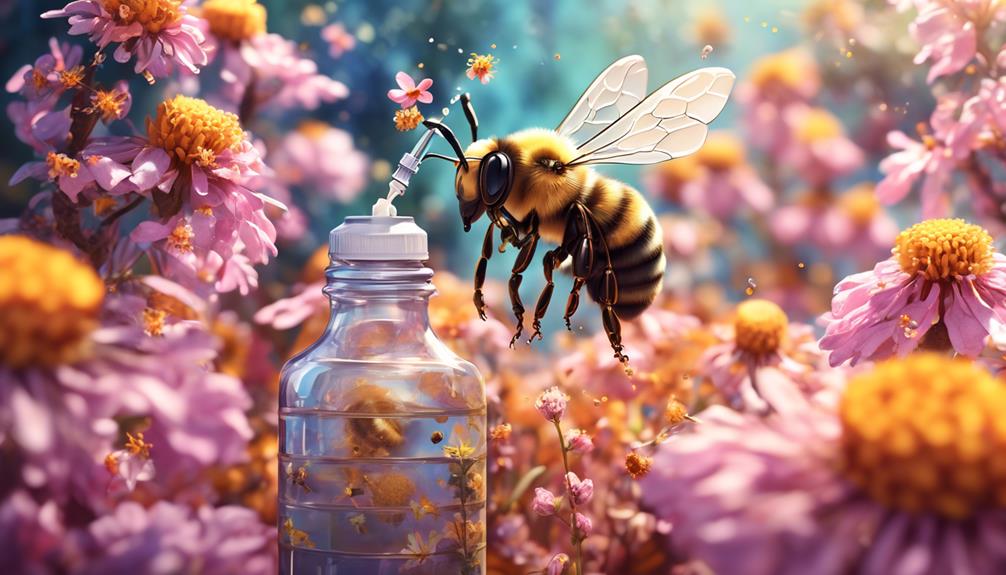
While bees are typically attracted to floral scents, it's essential to understand that they can also be inadvertently lured by other odors, including certain chemicals found in bug sprays. Bees use their sense of smell, primarily through their antennae, as a guide to navigate their environment and locate food sources. These antennae are packed with olfactory receptors, enabling bees to detect a wide range of chemical cues, including the volatile compounds often found in bug sprays.
The attraction to these compounds isn't necessarily intentional on the bee's part, it's more a case of mistaken identity. Many bug sprays contain floral compounds or pheromones that can confuse bees. For instance, pyrethrins, a common ingredient in bug sprays, are derived from chrysanthemum flowers, which bees naturally find alluring.
However, this attraction to bug spray is detrimental to bees, leading to exposure to toxic chemicals. This is an important factor to consider in conservation efforts, as bees play a crucial role in pollination and maintaining biodiversity. Therefore, understanding this unexpected attraction can help in the development of bee-friendly pest control strategies.
The Composition of Bug Sprays
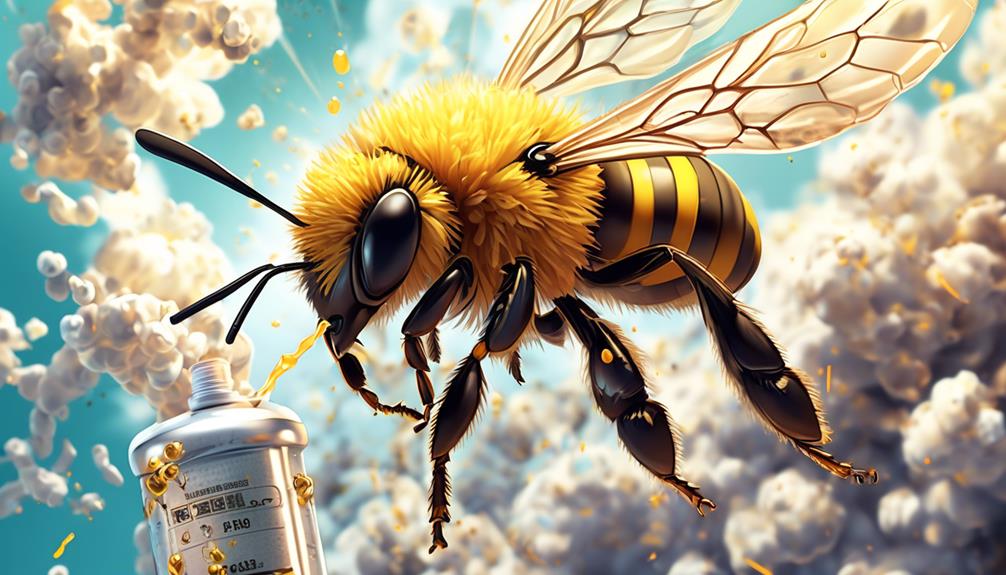
To comprehend why bees might be attracted to bug sprays, it's crucial to delve into the specific composition of these products. Most bug sprays consist primarily of one or more active ingredients, which are chemicals designed to kill or repel pests. In addition, they contain various inert ingredients, which serve to improve the spray's effectiveness, longevity, and scent.
The active ingredients often are synthetic versions of natural insecticides, like pyrethrins, derived from the chrysanthemum flower. These chemicals interfere with the insects' nervous system, leading to paralysis and eventual death. However, an interesting fact is that these chemicals often mimic the scent of certain flowers, which could potentially attract bees.
On the other hand, the inert ingredients also play a significant role. They may include solvents, preservatives, and fragrances. These fragrances are particularly interesting because they're designed to make the product more appealing to humans. Yet, they can also inadvertently attract insects, including bees.
Scientific Studies on Bees and Bug Sprays
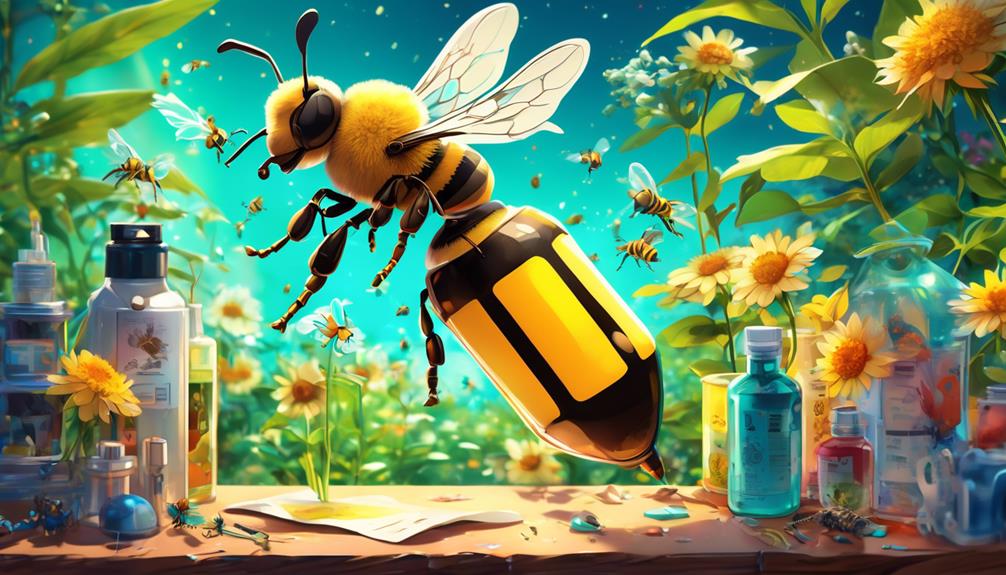
Delving into the realm of scientific research, you'll find intriguing studies exploring the relationship between bees and bug sprays. These studies reveal that most commercial bug sprays can have detrimental effects on bee populations.
One such study, conducted by the University of Sussex, found that certain types of bug sprays, specifically those containing a chemical called neonicotinoids, can't only harm bees but potentially lead to colony collapse. The research showed that bees exposed to this chemical suffered from impaired memory, navigation, and foraging skills, which are crucial for their survival.
In another landmark study by Lund University, it was discovered that even low levels of commonly used bug sprays can cause significant harm to bees. The researchers found that the bees exposed to low levels of these pesticides had reduced survival rates and produced fewer queens.
In a nutshell, these scientific studies suggest that bug sprays pose a significant threat to bees. They underscore the urgent need for developing safer alternatives to conventional bug sprays.
As you can see, the relationship between bees and bug sprays is complex and warrants further investigation. Be aware of these findings as you make choices about pest control in your own backyard.
Impact of Bug Sprays on Bee Population
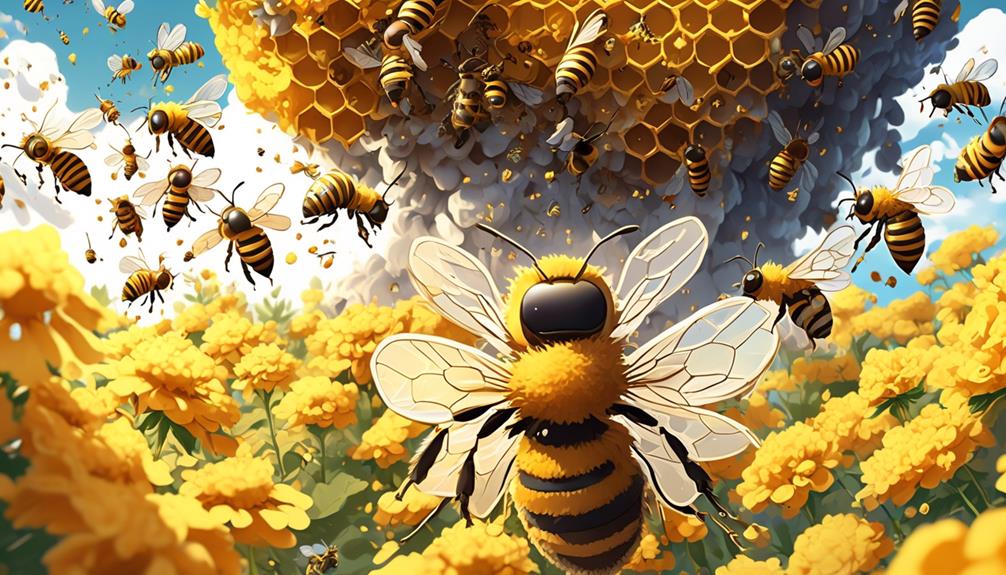
The pervasive use of bug sprays in residential and commercial areas is causing alarming declines in bee populations worldwide. You might not realize it, but each squirt of those pesticides in your garden can be devastating to these vital pollinators. Scientists have found that even low levels of pesticides can impair a bee's ability to forage for nectar, navigate back to the hive, and reproduce effectively.
To better understand the impact, consider this table:
Impact of Pesticides | Effect on Bees |
|---|---|
Impaired Foraging | Reduced ability to collect nectar and pollen, leading to decreased food supply in the hive. |
Navigation Issues | Difficulty returning to the hive, leading to increased bee mortality. |
Reproduction Problems | Lowered reproductive rates, leading to reduced hive growth and potential colony collapse. |
Safer Alternatives to Bug Sprays
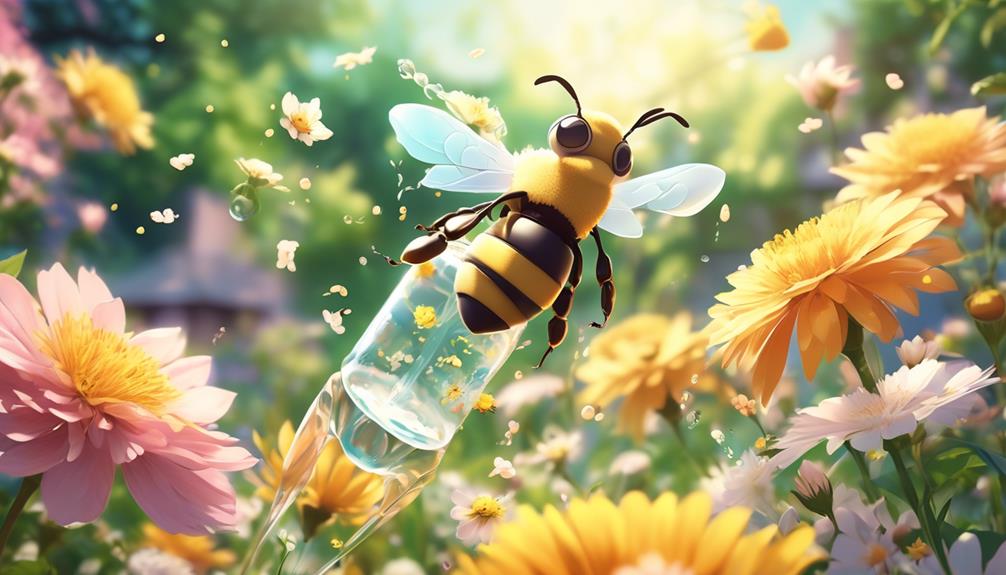
Given the grave consequences of common pesticides on bees, it's crucial that we explore safer, bee-friendly alternatives to traditional bug sprays. Eco-friendly options, such as essential oil-based repellents, are a viable alternative. These products, which often contain oil of lemon eucalyptus, can deter a variety of insects, including mosquitoes and ticks, without harming bees.
You might also consider biological controls, such as introducing natural predators of pests into your garden. For example, ladybugs and lacewings are known to feast on aphids, mitigating your need for chemical sprays. Furthermore, using physical barriers, like nets or traps, can often be just as effective as chemical deterrents.
Plant-based pesticides are another option. These pesticides, derived from plants that naturally repel pests, are less harmful to bees. Pyrethrum, for instance, is a compound derived from chrysanthemums and is noted for its efficacy against a wide range of insects while being relatively safe for bees.
Lastly, you can simply plant bee-friendly plants. Certain plants, such as lavender and marigolds, can naturally repel pests while attracting bees. By exploring these alternatives, you're not only protecting bees but also promoting a healthier ecosystem.
Personal Experiences and Observations
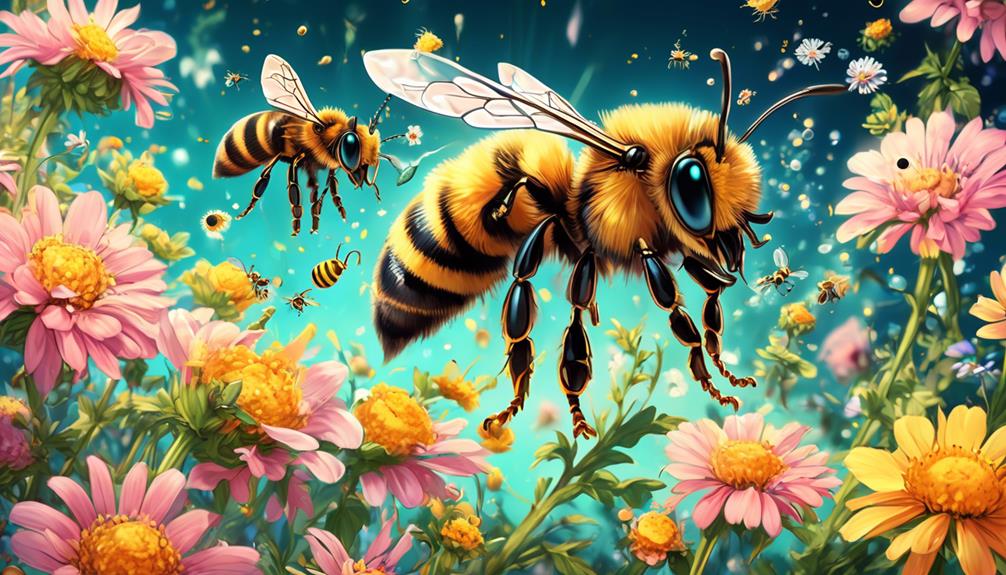
In your own backyard, you've likely observed bees buzzing about, seemingly unfazed by the bug spray you've just applied, providing a first-hand glimpse into their resilience and indifference towards common insect repellants. This behavior is not unusual, as it aligns with scientific findings that suggest bees, unlike other insects, are not deterred by traditional bug sprays.
Consider the following table, documenting personal observations and scientific conclusions:
Observation | Analysis | Emotional Response |
|---|---|---|
Bees buzzing despite spray | Evidence of bees' indifference to bug sprays | Awe at their resilience |
Bee population in garden constant | Suggests bug sprays don't affect bee populations | Relief and concern |
Bees returning to sprayed areas | Indicates bees' attraction to flowers outweighs repellent's effect | Fascination and curiosity |
From these observations, it's clear that bees are not like other insects. They aren't repelled by common bug sprays. This resilience, while fascinating, also prompts questions about our reliance on such sprays. Are they really serving their intended purpose, or are we merely adding unnecessary chemicals to our environment? The answer requires further investigation and scientific research.
Frequently Asked Questions
What Is the Lifespan of a Bee and How Does Exposure to Bug Spray Potentially Affect It?
The lifespan of a bee varies depending on the type. Worker bees typically live for a few weeks, while queens can live up to five years.
Now, if you're wondering about bug spray exposure, it's not good news. Pesticides can significantly shorten a bee's life, often killing them outright.
It's not just about lifespan, either. These chemicals can also affect a bee's ability to navigate, communicate, and reproduce.
Are There Specific Brands of Bug Sprays That Are More Harmful to Bees Than Others?
As you're evaluating different bug sprays, know that some brands can indeed be more harmful to bees than others. It's generally due to the active ingredients used. Pyrethroids, a common ingredient, is particularly lethal to bees.
Organic options, on the other hand, might be less harmful but aren't completely risk-free either. It's crucial to research and consider the potential impact on bee populations before using any product.
Do Bees Have Any Natural Predators That Are Repelled by Bug Spray?
Yes, bees have natural predators that can be repelled by bug sprays. These include wasps, hornets, and some species of birds.
However, it's crucial to remember that such sprays can also harm bees. They're not selective in their toxicity, meaning they can affect non-target species as well.
How Does Bug Spray Exposure Affect a Bee's Ability to Pollinate?
Exposure to bug spray affects a bee's ability to pollinate quite drastically. It impairs their navigation skills, making it hard for them to find flowers. Even worse, it can cause them to lose their lives, thus reducing the overall bee population.
Can the Use of Bug Sprays in a Residential Area Lead to a Significant Decrease in Local Bee Populations?
You're on the right track.
The use of bug sprays in your residential area can indeed lead to a significant decrease in local bee populations. These sprays often contain chemicals that are toxic to bees, impairing their ability to navigate, gather food, and reproduce. Over time, this can result in a sharp decline in their numbers.
It's crucial to consider alternative pest control methods to protect these vital pollinators.
Conclusion
In conclusion, bees aren't attracted to bug sprays. Rather, these chemicals can harm or kill them. Studies show a significant impact on bee populations from widespread bug spray use.
Opting for safer alternatives, like natural repellents, can help protect these crucial pollinators. Observations and personal experiences further corroborate these findings, reinforcing the need for mindful pest management.
So, next time you reach for bug spray, remember: it's not a bee's best friend.

